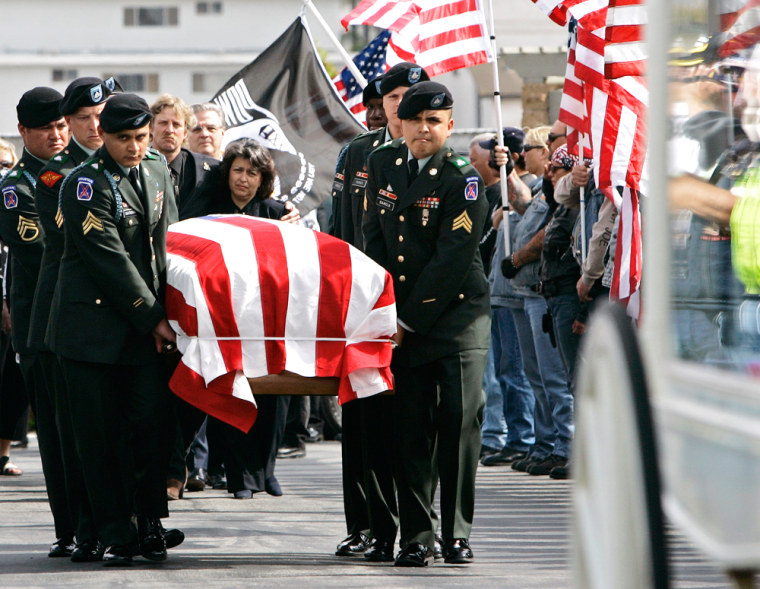Five more U.S. troops and a sailor were killed in Iraq, the military said Tuesday — making 2007 the deadliest year for American forces in Iraq, according to an Associated Press count.
At least 853 U.S. military personnel have died in Iraq so far this year — the highest annual toll since the war began in March 2003, according to AP figures. Some 850 troops died in 2004.
The grim milestone passed despite a sharp drop in U.S. and Iraqi deaths here in recent months, after a 30,000-strong U.S. force buildup.
Deadly IEDs
The five U.S. soldiers died Monday in two separate attacks, Rear Adm. Gregory Smith, director of the Multi-National Force-Iraq's communications division, told reporters Tuesday. "We lost five soldiers yesterday in two unfortunate incidents, both involving IEDs," he said, using the military's shorthand for improvised explosive devices — roadside bombs.
In another statement, American forces said a sailor died of injuries from an explosion Monday in Salahuddin province, north of Baghdad.
Their deaths brought to at least 3,855 the number of U.S. troops who have died since the beginning of the Iraq war, according to an AP count. The figure includes eight civilians working for the military.
At least 852 American military members died in Iraq in 2007, compared with 850 troops in 2004. That year saw mostly larger, more conventional battles like the campaign to cleanse Fallujah of Sunni militants in November, and U.S. clashes with Shiite militiamen in the sect's holy city of Najaf in August.
Widening reach of U.S. military
But the American military in Iraq reached its highest troop levels in Iraq this year — 165,000. Moreover, the military's decision to send soldiers out of large bases and into Iraqi communities means more troops have seen more "contact with enemy forces" than ever before, said Maj. Winfield Danielson, a U.S. military spokesman in Baghdad.
"It's due to the troop surge, which allowed us to go into areas that were previously safe havens for insurgents," Danielson told the AP on Sunday. "Having more soldiers, and having them out in the communities, certainly contributes to our casualties."
Last spring, U.S. platoons took up positions — often in abandoned houses or in muddy, half-collapsed police stations — at the heart of neighborhoods across Baghdad and nearby communities.
The move was part of President Bush's new strategy to drive al-Qaida from the capital.
It was the first time many residents had seen U.S. troops up close, rather than whizzing by in armored convoys en route to huge bases that house thousands of troops. And it was the first time many U.S. troops went to bed each night outside those fortresses, to the sounds of Iraqi life: gunfire, the roar of helicopters overhead and an occasional explosion.
The move has worked, U.S. officials say. Increasingly, the sounds of Baghdad include children playing on the streets.
"It's allowed Iraqi civilians to get more comfortable with U.S. forces — increasing the number of tips we get from Iraqi citizens," Danielson said. "That leads us to insurgent leaders and cells, and cleaning those up has led to a decline in violence over the past couple months."
Death tolls for Americans and Iraqis have fallen dramatically in recent months, as have the number of bombings, shootings and other violence.
At least 1,023 Iraqi civilians died in September; in October, that figure was just 875. The number of U.S. troop deaths dropped from 65 to 36 in the same period, according to statistics kept by the AP. That's the lowest monthly toll of American deaths this year.
On average, 56 Iraqis — civilians and security forces — have died each day so far in 2007, according to the AP count.
Mass grave located
Meantime, Iraqi troops discovered 22 bodies in a mass grave in the Lake Tharthar area northwest of Baghdad, the U.S. military also said Tuesday. The bodies were found during a joint operation Saturday.
It was the second mass grave found in the area in less than a month.
Meanwhile, the United States said it planned to release nine Iranian prisoners in the coming days, including two captured when U.S. troops stormed an Iranian government office in Irbil last January. The office was shut after the raid, but it reopened as an Iranian consulate on Tuesday, Iraqi and Iranian officials said.
Gates says Iran fulfills pledge
A military spokesman said Iran appears to have kept its promise to stop the flow into Iraq of bomb-making materials and other weaponry that Washington says has inflamed insurgent violence and caused many American troop casualties.
U.S. Defense Secretary Robert Gates said last week that Iran had made such assurances to the Iraqi government.
"It's our best judgment that these particular EFPs ... in recent large cache finds do not appear to have arrived here in Iraq after those pledges were made," Smith said.
Among the weapons Washington has accused Iran of supplying to Iraqi insurgents are EFPs, or explosively formed projectiles. They fire a slug of molten metal capable of penetrating even the most heavily armored military vehicles, and thus are more deadly than other roadside bombs.
The No. 2 U.S. commander in Iraq, Lt. Gen. Ray Odierno, said last week that there had been a sharp decline in the number of EFPs found in Iraq in the last three months. At the time, he and Gates both said it was too early to tell whether the trend would hold, and whether it could be attributed to action by Iranian authorities. Iran publicly denies that it has sent weapons to Shiite militias in Iraq.
